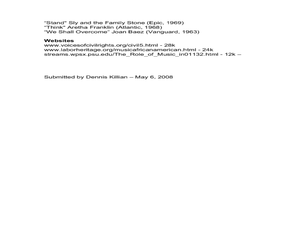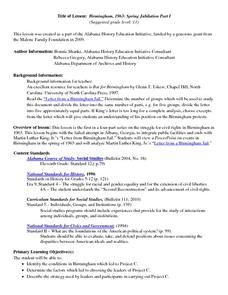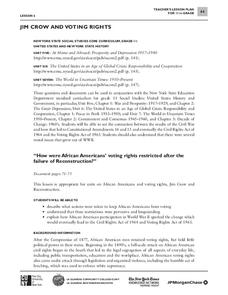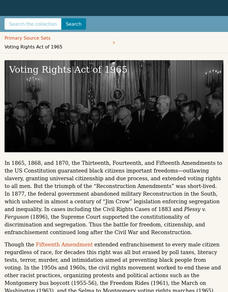DocsTeach
Civil Rights or Freedom? When Vietnam and the Civil Rights Movement Clashed
When Martin Luther King Jr. took a stand against the Vietnam War, interests collided. With a letter from Jackie Robinson to Lyndon B. Johnson, the baseball legend urges the president to remain firm in his resolve for civil rights. Young...
US National Archives
Documented Rights Educational Lesson Plan
How have groups struggled to have their unalienable rights recognized in the United States? Acting as a research team for the Human Rights Council of the United Nations, your young historians will break into groups to research...
Curated OER
Beyond the Playing Field -Jackie Robinson, Civil Rights Advocate
Students examine and discuss documents pertaining to issues of the civil rights movement.
Curated OER
Understanding the Music of the Civil Rights Movement
Young scholars examine protest music and songs from the Civil Rights movement. In this music of the Civil Rights era instructional activity, students listen to selected music before working in groups to determine who the music was...
Penguin Books
Core Curriculum Lesson Plans for The Lions of Little Rock
Schools in the 1950s and 60s looked very different from the schools we know today. An educator's guide explores the civil rights movement and, specifically, the process of integrating schools. Questions cover key themes in the novel and...
Alabama Department of Archives and History
Birmingham 1963: Spring Jubilation Part 1
As part of a study of the 1963 quest for civil rights in Birmingham, Alabama, class members view a PowerPoint that details the struggle and analyze Martin Luther King, Jr.'s "Letter from a Birmingham Jail."
K20 LEARN
The Bank Of Justice: Civil Rights In The US
To launch a study of racial segregation and integration, young historians first watch a news video about a prom in Georgia that was first integrated in 2013. They then compare the goals in Lincoln's Gettysburg Address to King's "I Have a...
City University of New York
Jim Crow and Voting Rights
Class groups examine primary source documents to determine how the voting rights of African Americans were restricted after the failure of Reconstruction, and how African American participation in World War II lead to change.
Digital Public Library of America
Voting Rights Act of 1965
Despite the passing of the Thirteenth, Fourteenth, and Fifteenth Amendments, as well as the passing of the Voting Rights Act of 1965, the struggle to ensure fair voter registration and election procedures continues. Young historians...
Middle Tennessee State University
Fights, Freedom, and Fraud: Voting Rights in the Reconstruction Era
As part of a study of post Civil War era, young historians investigate the changes in voting rights during the Reconstruction Era (1863-1876), the fraud involved in the Hayes-Tilden presidential election of 1876, and efforts by Pap...
Digital Public Library of America
Ida B. Wells and Anti-Lynching Activism
A packet of 13 primary sources provides young historians with insight into the anti-lynching activism of civil rights Ida B. Wells. Included are images of Wells, her letters, a political cartoon, newspaper lynching announcements, and a...
Curated OER
Jackie Robinson, Civil Rights Activist
Students analyze the life of Jackie Robinson and determine which characteristics contributed to his success as the baseball player who broke the color barrier and as a political activist.
Facing History and Ourselves
The Legacies of Reconstruction
The final instructional activity in the seven-resource Reconstruction Era collection examines the legacies of Reconstruction. Class members investigate why the period has been called an "unfinished revolution," "a splendid failure," and...
US House of Representatives
“‘The Negroes’ Temporary Farewell,” Jim Crow and the Exclusion of African Americans from Congress, 1887–1929
Despite some advances made during the Reconstruction Era following the Civil War, the period from 1887 through 1929, African Americans serving in Congress suffered severe setbacks due to Jim Crow Laws and voter suppression. Class members...
Curated OER
Civil Rights Heroes
Students explore the actions of people involved in the Civil Rights Movement. They explore the reasons for the movement and its successes and failures, and explain the sacrifices made by those who participated in the movement.
Alabama Department of Archives and History
African American Life After the Civil War - Sharecropping
What is the sharecropping system? What role did it play in the post-Civil War economy of the South? Who were the sharecroppers? Who employed them? How were they paid? To answer these questions, kids examine a series of sharecropper...
Curated OER
African-American Soldiers After World War I: Had Race Relations Changed?
Students utilize an online database to conduct research and analyze the conditions for African-Americans before and after World War I. They consider the role of the 92nd and 93rd divisions in affecting social change.
City University of New York
African Americans and the Populist Movement
Why did the Populist Party fail to ally itself with African American farmers? To answer this essential question, class members investigate the Populist Era (188-1900) and read an article written by Tom Watson, a Populist leader.
US House of Representatives
A Picture is Worth a Thousand Words
Groups select a photograph from one of the four eras of African Americans in Congress and develop a five-minute presentation that provides background information about the image as well as its historical significance. The class compares...
Center for History Education
African Americans and the Democratic Party
Why did African American voters switch from the Republican Party to the Democratic party during the Depression Era? That is the question young historians attempt to answer as they study primary source documents from the period. The focus...
US House of Representatives
Keeping the Faith: African Americans Return to Congress, 1929–1970
The third lesson in a unit that traces the history of African Americans serving in the US Congress examines the period from 1929 through 1970. After reading a contextual essay that details the few African Americans elected to Congress...
US House of Representatives
Permanent Interests: The Expansion, Organization, and Rising Influence of African Americans in Congress, 1971–2007
The fourth installment of the seven-lesson unit focused on African Americans elected to and serving in the US Congress looks at the period from 1971 through 2007. Class members read a contextual essay that provides background information...
John F. Kennedy Presidential Library & Museum
Analyzing the Inaugural Address
Get high school historians to step outside their own shoes by responding to JFK's inaugural address from the perspective of a civil rights activist, a soviet diplomat, or a Cuban exile. After a class discussion about the address,...
Facing History and Ourselves
Interracial Democracy
Radical Reconstruction, the 10-year period referred to after Congress passed the Reconstruction Act of 1867, saw the establishment of manhood suffrage, men voting without any racial qualifications. Southern states also rewrote their...























